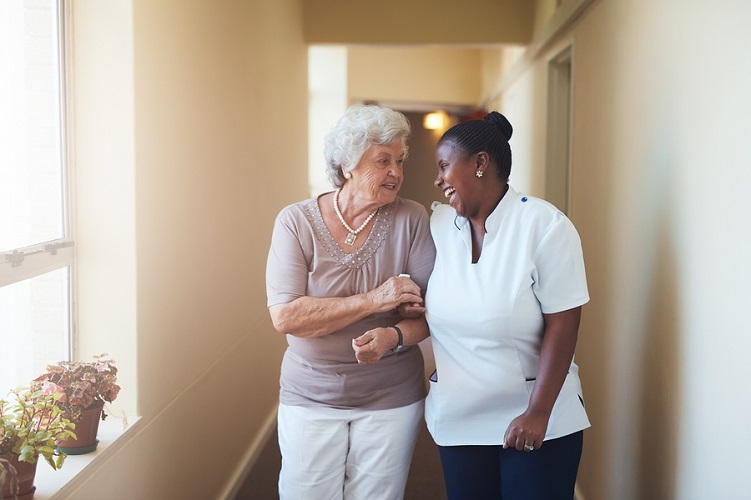Did you know that preventing falls at home is one of the top safety issues for the elderly? One of the main reasons seniors need assistance is due to mobility problems that are the result of a fall.
If you are a family caregiver, preventing your elderly loved one from falling is always a concern. According to Fall Prevention Facts reported by the National Council on Aging, one in four Americans aged 65+ falls each year. Falls are the leading cause of fatal injury and the most common cause of nonfatal trauma-related hospital admissions among older adults. Many times, death occurs with the elderly after months of medical care and treatment.

While many elderly fear of falling, falls are preventable.
To best prevent falls, a caregiver’s goal is twofold:
- Consider the elder’s mental and physical limitations.
- Help reduce risks within the home environment.
Mental and Physical Limitations
Seniors often struggle with getting old because they can’t think as clearly and get frustrated with their own limitations. With age comes decreased cognitive functions, problems with balance and mobility, and other health issues.
When preventing falls, caregivers should consider all health limitations of the senior, paying attention to their movements and needs. Allow more time and understand the senior will require more help with basic tasks like dressing, sitting down, walking, bathing, etc.
Simple actions such as getting up too quickly or overextending to reach an item can cause a senior to lose balance and fall. When seniors have difficulty concentrating, they become more susceptible to falling from a misstep or hitting something when they move past it.
Here are 6 ways seniors can prevent falls due to mental and physical limitations:
- Increase balance and strength with exercises such as water aerobics, walking, Tai Chi and yoga.
- Use aids such as walking canes, walkers, rails, and long-handled reachers.
- Slow down. Avoid moving too quickly and pause more frequently.
- Wear flat, comfortable shoes and sit down for basic activities such as showering and dressing.
- Eat regularly to increase physical strength and improve mental alertness.
- Make lists for reminders, contact information and other information.
Home Environment
When thinking about elderly safety in the home environment as it relates to falls, look for ways to improve access and safe-proof locations. Consider the layout, lighting, and other factors that relate to the environment of the home, community, and other places for visiting.
Paying attention to details in the elderly’s surroundings is important when preventing falls. When seniors have difficulty walking, care should be taken to limit the distance they have to walk and remove clutter in walkways. As eyesight declines, increased lighting may be needed.
Here are 8 ways seniors can prevent falls in their environment:
- Clear away clutter in the home to create more open pathways.
- Remove telephone and electrical cords from heavily used areas.
- Add adequate lighting in places used regularly and put extra switches in accessible locations.
- Keep night lights in the hallway, kitchen and bathroom to avoid fumbling in the dark.
- Change locations and increase the quantity of emergency supplies and fire extinguishers for easier reach when needed.
- Secure area rugs with non-slip backing or tape.
- Repair damaged tiles and carpeting that have rips, creases, or looseness.
- Avoid rocking, swiveling, or moving furniture and make necessary repairs to damaged furniture.
Even when taking precautions to prevent falls, it is difficult to change habits and look at a home a senior has lived in for years with a new perspective for safety.
As caregivers, we have a trained eye for recognizing problems and preventing falls. We also know how to handle the situation if a fall were to occur. Our in-home care services can help make life easier and safer for your elderly loved ones. If you would like more information about the our services, contact us at (770) 385-0300.
